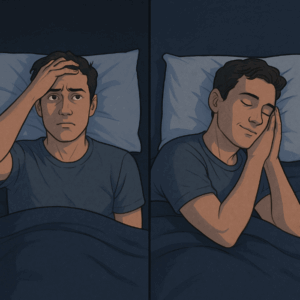😴 How Poor Sleep Worsens Anxiety and Depression — and What You Can Do About It
 We all know the frustration of lying awake at night, tossing and turning. But poor sleep is more than just an inconvenience. Research shows that insomnia and disturbed sleep are closely linked with both anxiety and depression. In fact, sleep problems are often one of the first warning signs of mental health difficulties.
We all know the frustration of lying awake at night, tossing and turning. But poor sleep is more than just an inconvenience. Research shows that insomnia and disturbed sleep are closely linked with both anxiety and depression. In fact, sleep problems are often one of the first warning signs of mental health difficulties.
The good news is that sleep can be improved without relying only on sleeping pills. Evidence-based strategies such as sleep hygiene, relaxation techniques, exercise, and Cognitive Behavioural Therapy for Insomnia (CBT-I) offer long-term solutions.
🧠 The Sleep–Mood Connection
Sleep and Anxiety
-
Poor sleep increases the brain’s “alarm system,” making you more sensitive to stress.
-
Lack of rest raises cortisol and adrenaline, causing racing thoughts, irritability, and panic-like symptoms.
-
Studies show people with chronic insomnia are much more likely to develop anxiety disorders.
Sleep and Depression
-
Insomnia is one of the most common symptoms of depression.
-
Poor sleep worsens low mood, fatigue, and lack of motivation.
-
Fragmented sleep disrupts serotonin and dopamine regulation, which are crucial for emotional stability.
-
Research shows that treating insomnia reduces relapse risk in depression.
🌿 Insomnia Treatment Without Medication
1. Sleep Hygiene: The Basics
-
Keep a regular sleep schedule, even on weekends.
-
Make your bedroom dark, quiet, and cool.
-
Avoid caffeine, alcohol, and heavy meals close to bedtime.
-
Limit screen exposure (phones, TV, laptops) for at least 1 hour before bed.
Evidence: Strong clinical evidence shows consistent routines improve sleep efficiency and reduce insomnia symptoms.
2. Relaxation Techniques
-
Deep breathing: slow, abdominal breathing calms the nervous system.
-
Progressive muscle relaxation: gently tense and release each muscle group.
-
Guided imagery: focus on a calming mental image (like a beach or forest).
Evidence: Randomised trials confirm relaxation techniques reduce sleep onset latency and improve sleep quality.
3. Exercise for Better Sleep
-
Regular aerobic activity (walking, running, cycling) improves sleep duration and reduces awakenings.
-
Yoga helps calm the mind, reduce stress hormones, and enhance deep sleep.
-
Avoid vigorous exercise right before bedtime — aim for morning or afternoon workouts.
Evidence: Harvard studies show 150 minutes of moderate exercise per week reduces insomnia symptoms by up to 65%.
4. Cognitive Behavioural Therapy for Insomnia (CBT-I)
-
Considered the gold standard non-drug treatment for chronic insomnia.
-
Techniques include:
-
Stimulus control → using the bed only for sleep and intimacy.
-
Sleep restriction → limiting time in bed to consolidate deeper sleep.
-
Cognitive therapy → addressing “sleep anxiety” (worrying about not sleeping).
-
Evidence: CBT-I has stronger and longer-lasting benefits than sleeping pills, without side effects.
⚖️ When to Seek Help
If poor sleep lasts more than 3 nights per week for over 3 months, or if it is causing daytime fatigue, mood swings, or concentration problems, it may be insomnia disorder. Consult a mental health professional for structured treatment.
💡 Key Takeaway
Poor sleep is not just a symptom — it is a driver of anxiety and depression. The good news is that non-medication approaches like sleep hygiene, relaxation, exercise, and CBT-I can restore healthy sleep and improve mood naturally.
👨⚕️ Consultation
I’m Dr. Srinivas Rajkumar T, Consultant Psychiatrist at Apollo Clinic, Velachery, Chennai.
I provide structured therapy plans for insomnia, anxiety, and depression, focusing on safe, evidence-based strategies without over-reliance on medication.
📞 Contact: +91 8595155808